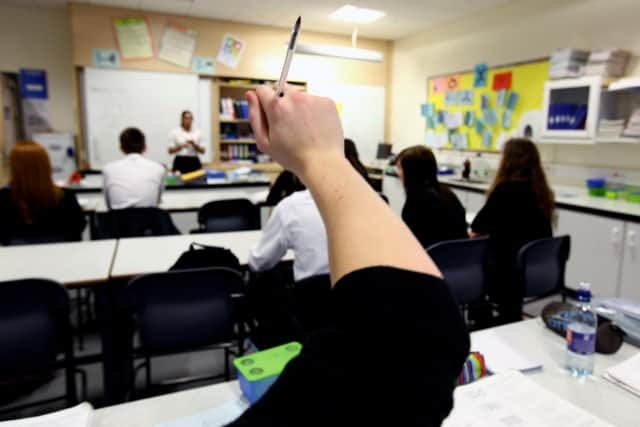Bad behaviour in schools may be echoing adult culture wars. Here's how to calm our classrooms – Karyn McCluskey
There’s a quiet revolution going on in Scottish schools. You won’t see it in exam results or even in inspection results, but it’s there and it’s making a difference.
We’re always hearing about ‘bad behaviour’ in schools. It’s a perennial issue that always excites much commentary. But post-Covid, it’s likely that, in addition to difficult home lives, disrupted education has had an impact. Teachers are seeing a raft of ‘dysregulated’ pupils; unable to control their physical and emotional reactions.
Advertisement
Hide AdAdvertisement
Hide AdThe easy answer would be to exclude these kids from school – like the Gordian Knot, just cut them out – but where does that take us? Kids picked up by police; parents unable to stay with their excluded child because they must work; and of course, problems with their disrupted education increasing. There are no good outcomes here, for anyone.


Not ‘fluffy rubbish’
Last week I spent the day with primary and secondary school teachers in Glasgow and beyond. These schools have embedded restorative practices as a way of managing and changing the way our children and young people resolve arguments, disagreements and the everyday clashes that our children have to navigate in school – and life.
Children respond to the situations they find themselves in with the skills and language they know. If they haven’t the skills to understand or empathise with others, this can lead to escalation and sometimes aggression. The solution these teachers are implementing is teaching children to listen; to understand themselves and others; to own their actions; and to develop ways of repairing and building relationships. And in doing so, they are changing the norms and culture in the school.
I know what you’re thinking, “fluffy rubbish!”, and it’s true that teachers will still experience some extremes of behaviour, but can you honestly say that you have and use these vital skills when managing conflict? It’s underpinned by loads of research – not only in schools, but in the work we do in restorative justice in crime, where harm has been caused to a victim.
An eye for an eye
This approach has changed the schools where it’s been established. They feel different when you visit them. The kids practice it, and it becomes second nature, they know what to do, and do it often without being prompted by adults. It doesn’t mean there are no consequences, but it’s rooted in understanding the harm caused.
The big challenge is how to connect it to communities. There are a lot of dysregulated adults out there; you know, an eye for an eye. They may be the parents of the very children who now have better conflict-management skills than them.
The next generation are being supported to become negotiators, to disagree well, to understand and take accountability – an art that the grown-ups seem to have lost. From the independence and Brexit referendums to the various culture wars of the past few years, we seem happier with extremes – some would say hate.
The Hate Crime Act comes into force next week, with numerous worries about how it will unfold. Our kids seem to be leading the way in how to address it, prevent it and learn from experiences. The abiding message from their work is ‘whatever the question is, the answer is relationships’.
Karyn McCluskey is chief executive of Community Justice Scotland
Comments
Want to join the conversation? Please or to comment on this article.
